Be prepared for Sonkram
Of all the feasts and festivals in Thailand, which are many, the Songkran Festival is the most striking, and it is celebrated not only in this country but also in Burma, Cambodia and the Lao State.
Songkran has traditionally been celebrated as the New Year for many centuries, and is believed to have been adapted from an Indian festival. It is now observed nationwide, even in the far south. However, the most famous Songkran celebrations are still in the northern city of Chiang Mai, where it continues for six days and even longer. In Phuket the main day is the 13th of April, with some starting a day early or carrying on the next day.
The date of the festival was originally set by astrological calculation, but now fixed to the 13th of April which is in the hottest time of the year in Thailand, at the end of the dry season.
Songkran is a Buddhist festival and many people go to a wat (Buddhist monastery) to pray and give food to monks. They may also cleanse Buddha images from household shrines as well as Buddha images at monasteries by gently pouring water mixed with a Thai fragrance over them. It is believed that doing this will bring good luck and prosperity for the New Year. In many cities, such as Chiang Mai, the Buddha images from all of the city’s important monasteries are paraded through the streets so that people can toss water at them, ritually ‘bathing’ the images, as they pass by on ornately decorated floats.
But the most obvious celebration of Songkran is the throwing of water. Thais roam the streets with containers of water or water guns (sometimes mixed with mentholated talc), or post themselves at the side of roads with a garden hose and drench each other and passers-by. This, however, was not always the main activity of this festival. Songkran was traditionally a time to visit and pay respects to elders, including family members, friends, neighbours, and monks. The songkran festival is counted as a new life. The throwing of water originated as a way to pay respect to people, by capturing the water after it had been poured over the Buddha’s for cleansing and then using this “blessed” water to give good fortune to elders and family by gently pouring it on the shoulder.
Among young people the holiday evolved to include dousing strangers with water to relieve the heat, since April is the hottest month in Thailand (temperatures can rise to over 100°F or 40°C on some days). This has further evolved into water fights and splashing water over people riding in vehicles.
In recent years there have been calls to moderate the festival to lessen the many alcohol-related road accidents as well as injuries attributed to extreme behaviour such as water being thrown in the faces of traveling motorcyclists.
Songkran is also celebrated in many places with a pageant in which young women demonstrate their beauty and unique talents, as judged by the audience. The level of financial support usually determines the winner, since, to show your support you must purchase necklaces, which you place on your chosen girl.
In Phuket Songkran starts off innocuously enough but by midday on April 13 streets are lined with pickup trucks with their beds loaded with ice-cold water which is thrown at any passer by. It can be a chaotic scene.
Small children and adults alike delight in using water guns and spraying anyone who comes in their path – no one is safe. It is best to leave leave your cameras and anything likely to suffer water damage behind in your hotel room, because of all the water flying around.
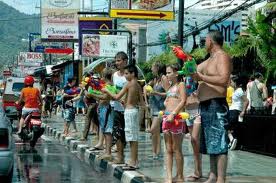
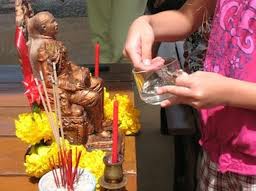
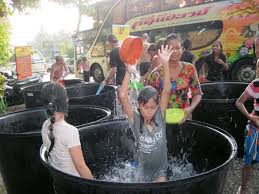
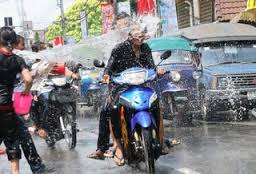
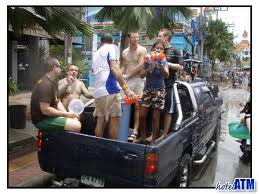





Scubacat Community